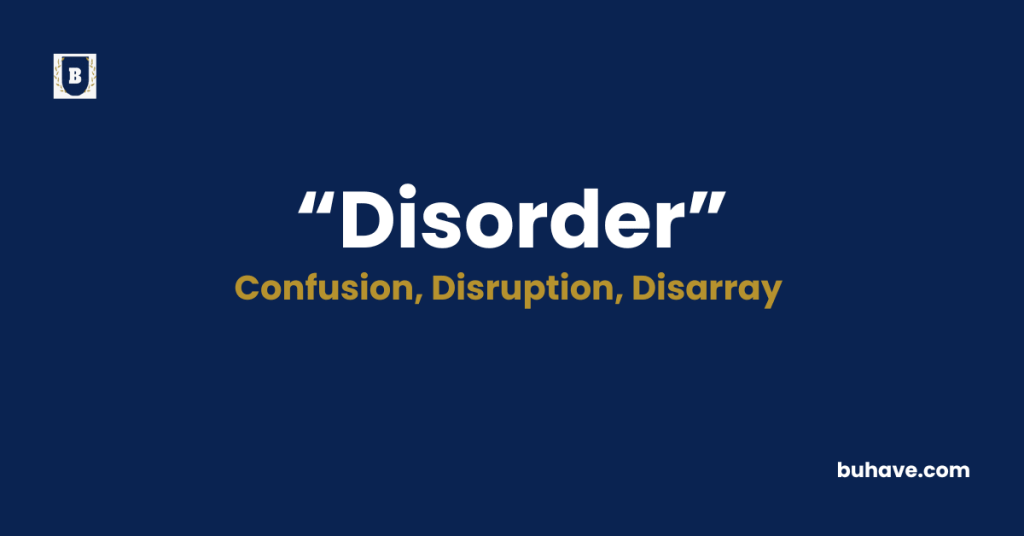The word Disorder (noun) refers to a state of confusion, disorganization, or a disturbance in physical or mental health. In this guide, you’ll learn the full definition, synonyms, antonyms, etymology, and real-life examples of how to use Disorder correctly in sentences.
Disorder Explained in Depth
A complete and detailed guide to the word Disorder including meaning, definition, examples, etymology, synonyms, and antonyms.
Meanings of Disorder
Disorder means a lack of order or regular arrangement, which can refer to chaos, confusion, or a disruption of physical or mental function. It’s often used in both general and medical contexts to describe problems in systems, behavior, or health.
Definition
Disorder refers to a state in which normal functioning is disrupted or impaired. This disruption may occur in various forms—such as mental disorder (e.g., depression or anxiety), physical disorder (e.g., digestive disorder), or social disorder (e.g., civil unrest). In medicine and psychology, a disorder typically indicates a diagnosable condition that negatively affects well-being, behavior, or body systems. Outside of clinical usage, it can also describe general chaos or confusion, such as a room being in disorder or society lacking organization. The concept of disorder reflects a breakdown in structure, predictability, or harmony, and it is often used to highlight the need for intervention, restoration, or healing in whatever system is affected—be it personal health, public order, or natural processes.
Etymology
The word disorder comes from the Old French desordre, which in turn stems from Medieval Latin disordinare, meaning “to throw into confusion.” The Latin roots are dis-, meaning “apart” or “away,” and ordo, meaning “order.” Originally used in English in the 15th century, “disorder” carried the meaning of disrupting a proper arrangement or established sequence. Over time, it developed broader applications—extending into social, medical, and psychological realms. In modern usage, “disorder” is especially prominent in medical and mental health contexts, where it represents specific conditions that interfere with normal bodily or mental functioning. The word has maintained its core implication of breakdown or imbalance, whether in an individual or a system.
Example Sentences
- The doctor diagnosed her with a rare neurological disorder.
- The country fell into disorder after the leadership crisis.
- His thoughts were in disorder, making it difficult to concentrate.
Disorder Synonyms
- Chaos
- Confusion
- Disruption
- Disturbance
- Disarray
- Imbalance
- Dysfunction
- Malfunction
- Turmoil
- Trouble
Disorder Antonyms
- Order
- Harmony
- Balance
- Organization
- Stability
- Peace
- Structure
- System
- Function
- Control
FAQs about Disorder
Here are some frequently asked questions (FAQs) about the word “Disorder”
1. What does “disorder” mean?
It refers to a lack of order or a disruption in normal functioning, whether physical, mental, or social.
2. Is “disorder” a medical term?
Yes, in medicine and psychology, it refers to conditions that impair normal functioning, such as anxiety disorders or eating disorders.
3. Can “disorder” be used outside of health contexts?
Absolutely. It can describe chaos, confusion, or lack of organization in any area—like a messy room or civil unrest.
4. What is the difference between a “disease” and a “disorder”?
A disease often has a clear cause and identifiable symptoms, while a disorder may have more complex or less defined origins and may affect behavior or mental health.
5. Is “disorder” always negative?
Generally, yes. It suggests dysfunction, imbalance, or confusion that typically requires attention or correction.

















